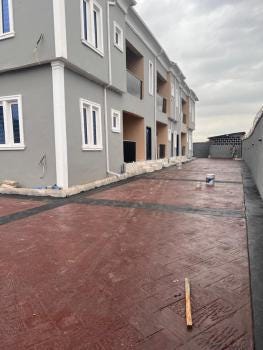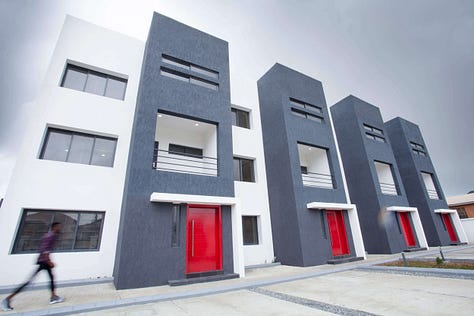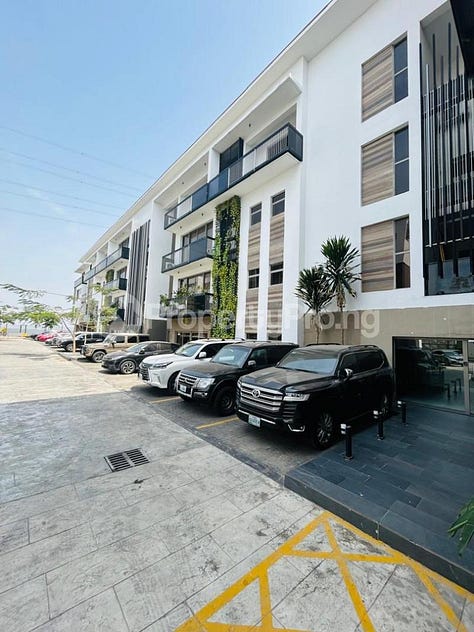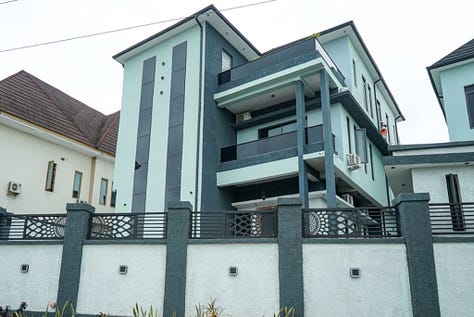On The Rise of Luxury Prisons in Lagos
or to quote someone dear to me "The Lekkification of Lagos Architecture"






Since returning from Kenya, I've resumed my long morning walks, a practice I'd abandoned for those familiar Lagosian reasons. In the intervening months, the landscape has transformed. Single-family homes are being demolished, and long-dormant plots cleared of all vegetation, to make way for what can only be described as 'luxury prison apartments.' What's truly baffling is their uniformity: devoid of greenery, adorned with pointless metalwork, random brick accents, entrances turned away from the gate, a monochrome palette of white or grey/black, minimal parking, and zero communal spaces.
My neighbourhood has undergone a dramatic transformation in the past five years. What was once roughly a 60/40 split between single-family homes and apartments is now reversed, with apartments dominating at 70%. This shift is driven by the passing or downsizing of older residents, leaving their properties to children who often opt for demolition and the construction of terrace homes or apartment blocks.
I suspect a kind of domino effect is at play. Once a few individuals in the area initiate this development trend, others, during their morning walks, simply inquire about the developer and architect. They then proceed to commission the same team, resulting in a proliferation of standardised, often draconian housing, replacing unique, environmentally functional, and aesthetically pleasing homes.
My long-standing fascination with Nigeria's evolving architectural landscape stems from my belief that it serves as a visual representation of our current state. Our built environment is an outward manifestation of our collective values and aspirations, whether consciously acknowledged or not.
In the end, the architecture we create is always an expression of our collective ideals, desires, and needs. - Alain de Botton, The Architecture of Happiness.
When RAYE criticised the Federal and State Government about Lagos's unlivable conditions, many Nigerians, predictably, tribalised her comments. Government officials even joined in, ludicrously claiming Lagos has no odour. This whole episode struck me as darkly comical. To defend the indefensible, you must abandon all rational thought. Anyone who visit lagos for 6 hours alone would tell you that it smells, its over crowded and its ugly to look at right now.
The visceral anger displayed in response to RAYE's criticism reveals a deep-seated insecurity. It's perceived as a personal attack, a challenge to one's identity. This defensiveness, I believe, stems from a form of cognitive dissonance coupled with collective narcissism. We struggle to reconcile the reality of our environment with the idealised image we hold of ourselves and our city. We are, in essence, projecting our internal conflicts onto the external world.
This environment, this Lagos we inhabit, is a stark reflection of our collective psyche. It's a tangible manifestation of our internal state. To me, it screams of growing intolerance, a fracturing of community as we retreat into isolated silos. There's a deep disconnection from the land itself – I'm not kidding, I saw a house last week, concrete jungle, no greenery, but a single, pathetic potted palm outside the gate, two leaves clinging on! It suggests a decline in education, evidenced by the rampant use of cheap, hazardous materials. It speaks of a profound inability to envision a sustainable future, and a desperate scramble for quick profit in a failing economy, rather than a genuine attempt to address the housing crisis.
We tolerate what we, deep down, believe we deserve. The convenient narrative of 'it's all poverty' absolves us of responsibility, ignoring our agency in shaping our reality. We, as Nigerians, are active participants in creating this environment, and we must own that fact. This is not simply about economics; it's a mirror reflecting our collective self-image, our tolerance for mediocrity, and our fear of confronting uncomfortable truths. We have built this, and we must change it.
Low Quality elite build Low Quality houses
Its ameuter season in Lagos Real Estate and no one can tell me otherwise.
Honestly, when I hear young people in Lagos say they're 'into property,' I struggle to suppress a wry smile. There's a prevailing mediocrity that's hard to ignore. These individuals often lack fundamental training – no masters in real estate management, no property law courses, no exposure to human-centred design or interior architecture. They're primarily acting as bag boys (and girls) for politicians or fraudsters perpetuating a cycle of superficial development. The social media feeds are filled with travel, but rarely with professional development – no industry conferences, no design workshops, just 'vibes
My Dad studied building and civil engineering and spent his whole life building houses, banks, hospitals, hotels across the country and all still standing today. There wasn’t a time that man wasn’t reading, travelling for confrences, taking courses and spending time with people. To build anything that makes sense around here you have to understand the history of where you’re coming from and where you are potentially going. I’ll meet someone who works in real estate and they have the worst social and interpersonal skills. They don’t understand people, the don’t understand the very core principles of land and why its important to own land. Its honest the cutestst little thing when men try to manspail the real estate industry to me here. So many words, so much emptiness. I wish more people would just say this is pure vibes and call it quits.
A significant factor behind the architectural richness of our homes in the 70s, 80s, and 90s wasn't solely economic prosperity; it was an era of genuine expertise. You couldn't simply declare yourself a 'developer' on a whim. I recall countless gatherings at my grandparents' and parents' homes, where the very fabric of the house told a story. They'd meticulously explain the design choices – why breeze blocks were used instead of windows, the origin and environmental considerations behind specific furniture or tiles, even the intricacies of the plumbing. Their studies were filled with books, evidence of the research and thought that preceded every brick and fixture, regardless of their profession
It's staggering how drastically things have changed in just a generation, or even a few decades. Ask someone today about the design or construction of their Lagos home, and you'll likely hear a litany of imported furnishings, but little substance. The government's failure to provide large-scale housing solutions has left this crucial sector open to exploitation by unqualified individuals. Millennials will bear the brunt of this short-sighted approach, facing a surge in health and social problems stemming from poorly planned developments. By the time the consequences are fully realised, those responsible will be long gone.
Lagos is in dire need of segmented mass housing solutions.
The baffling aspect of Lagos's housing development is its blatant disregard for actual human needs. These buildings are designed based on assumptions and caricatures, not reality. We don't need more sprawling, low-rise apartment blocks; we need sustainable, communal, and vertical development.
I made a podcast episode last year unpacking this which you can listen to on Spotify or Apple Podcast
Lets take my neighbourhood, for example. With four schools nearby, the logical target for new apartment blocks would be growing families. These families need practical amenities: two to three bedrooms, communal spaces for children to play and parents to socialise, and rentable spaces for events like birthday parties – amenities they’d typically find in a terrace or duplex. Yet, none of the current developments offer these. This begs the question: who are these buildings actually for?
The existing housing stock fails to reflect the demographics, their preferences, or their future needs. Consequently, many units remain vacant. A friend suggested these properties are bought as investments, left empty by absentee owners, or tied up in inheritance disputes. While these are valid points, I remain sceptical. In prime areas of cities like New York or London, empty apartments are rare, despite high demand. Why purchase a property only to leave it unoccupied?
If affordability is the core issue, why continue to develop properties that are clearly beyond the reach of the local population? There seems to be a fundamental disconnect between the supply and demand in the Lagos real estate market.
If everything is a luxury then nothing is a luxury
There’s no words lagosians have not bastardised more than Luxury.
This misappropriation of the term often stems from a lack of understanding of what true luxury entails. Most of the developers pushing this 'luxury' boom have limited exposure to genuine luxury living. They've risen from living in face-me-I-face-you buildings themselves, and now they're eager to recreate that experience, but with a 'luxury' twist.
But here's the thing: slapping a high price tag on a semi-detached house with black floors, minimal greenery, and barely enough space for two cars doesn't automatically make it luxurious. True luxury encompasses more than just material possessions. It's about creating an environment that fosters well-being, offers a sense of community, and respects the surrounding environment.
I won't even delve into the pricing and landlord issues – that could be a whole other essay! But it's clear that the current definition of 'luxury' in Lagos needs a serious rethink.
What can people do?
The longer I've been living in Lagos as an adult, the more I'm struck by this creeping sense of complacency. It feels like everyone's just… resigned. Like we've all collectively decided that this is how things are, and there's no point in demanding for more.
If you are in an estate group chat or apartment block group chat, what’s stopping you from saying lets all come together to put money or time to plant trees in the area. Make a competition out of it and put up a prize to incentivise people. How do you lobby to make rules about how people build that is in compliance with your values, e.g let the parking match the number of apartments being built.
If you’re not in an estate but an area, get a group of like minded people together, knock on doors, get signatures and lobby the local government to implement a few thing that don’t require state or federal authority to influence. You have a house of rep ember and senator, write to them, blow up their emails and phones to push housing regulation bills that improve the lives of people.
Also just bring back shame. If you’re friend is “into property” normalise telling that the houses they are building are ugly as hell.
Everytime I think of housing in lagos I go back to Emmanuel Quartey write up on “Why Beauty Matters” which I highly recommend you read after this.



Enjoyed this. . a lot was addressed but I wished there was more emphasis on the failure of the government than the responsibilities of private developers.
the motive for a developer is obviously maximum profit and not communitiy or cultural building altruism. the onus is on the Government to have a plan for an area, with clear aims, identifying local needs and a robust approach to enforcing accountability.
London is no Barcelona, and it has many detractors, but you can still see a reasonable semblance of order amidst the chaos of developments that have sprung up over the past decade or two. . . .developers can't suddenly develop without accounting for impact on the environment, transport facilities or historical heritage. Left to their own devices, developers in London would shunt a 100 storey block in the middle of historic Greenwich, but there is obvioulsy a structure in place that dissuades such behaviour. . . one can only hope that the Government in Lagos widens its focus from drainages to the built environment.
first off, are you the one who did the yahoonization of lagos rant on tiktok? can’t remember who the lady was, but your sub header and writing seem very similar to the aforementioned rant.
i have quite a lot to say in respect to this topic, but you’ve echoed my thoughts on this quite brilliantly, so enough said, and thank you.
my only reservation is that perhaps this isn’t simply a lagos problem; it is a nigerian problem, because many of the points raised permeate other nigerian cities. in fact, one of the most recent issue of the republic argues that it’s an african problem. the argument is quite dissimilar, but i think there’s a connecting thread to both positions.
here’s a link in case you’re interested: https://republic.com.ng/vol9-no1/african-architecture/
if you don’t mind and haven’t read it, i’ll recommend ‘the death and life of great american cities” by jane jacobs, and a personal favorite “how to kill a city” by moskowit.
thank you for writing. this was a long, but worthy read.